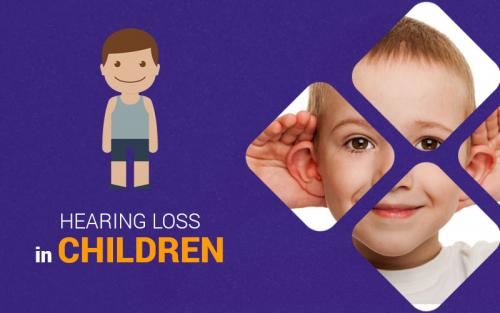How to Recognize Hearing Loss in Children

This article was originally published on https://blogelicious.com/
If you’re a parent, and you have a child suffering from a painful ear infection throughout the night. Fluid in the ear canal from a common cold or infection is one of the most common types of temporary hearing loss in children, but how do you know when it’s more serious than that?
According to the National Institute for Health, approximately three in every 1,000 babies are born with some degree of hearing impairment. Thanks to the Universal Newborn Hearing Screening Program, many states require hearing screenings for all newborns within hours of their birth.
Even if your newborn doesn’t test for a hearing impairment during the newborn screening, it’s still important to pay attention to your child’s hearing development. Many childhood diseases, such as measles and meningitis, can lead to the permanent hearing loss. And increasingly, the noise-induced hearing loss is affecting our children’s hearing. In the July 2012 issue of Pediatrics, the Centers for Disease Control and Prevention reported that more than 12 percent, or 5.2 million, of children between the ages of six and 19 suffer from the noise-induced hearing loss.
How Can You Check Hearing Loss in Children?
If you want to check hearing impairment in your child then Ask yourself the following questions:
- Does your child tilt their head to one side when listening?
- Do your children have any kind of balance issues – for example, is slow to sit or stand?
- Does your child fail to turn toward, or be startled by, loud noises?
- Do your kids fail to respond when their name is called?
- Are your kid’s speech slow, delayed, or limited to vibrating sounds that can be felt instead of heard? Do your children watch your lips when you speak?
- Does your child ask you to repeat yourself often, become easily frustrated or prefer to play by himself?
- Does your child turn the volume up loud on the television or other electronic devices?
If you answer “yes” to a majority of these questions, make an appointment immediately to have their hearing checked by your family physician or qualified audiologist. Your child may have a hearing impairment.
Should your family physician detect a hearing loss in children? In this case, they will most likely refer them to an otolaryngologist or ear, nose and throat (ENT) specialist. Through referring to these specialists, they want to identify the cause of the hearing loss in children and recommend a course of action.
Although this discovery can be unsettling for everyone concerned. Therefore, it requires a few simple alterations in the way so that you can communicate with your child with an ease.
- Make sure you face your child when you speak so they know you are talking to them. And can pay attention to what you are saying.
- Be sure to speak in a normal voice. An unobstructed view of your face is much more effective than raising your voice.
- Be patient. It’s frustrating when you can’t communicate with your child but he will most likely take his cues from you. If you are calm, chances are he will be, too.
Hearing impairments can range from mild to moderate, to severe or profound. However, early detection is the key to identifying the severity of the problem and developing an effective treatment plan. Children with undetected hearing loss often suffer from isolation. And depression due to delays in their ability to communicate with their family and peers. Those who have early intervention stand a better chance of successfully developing good speech and language skills. Kids with good hearing also develop better ability to enjoy the world around them.

Comments